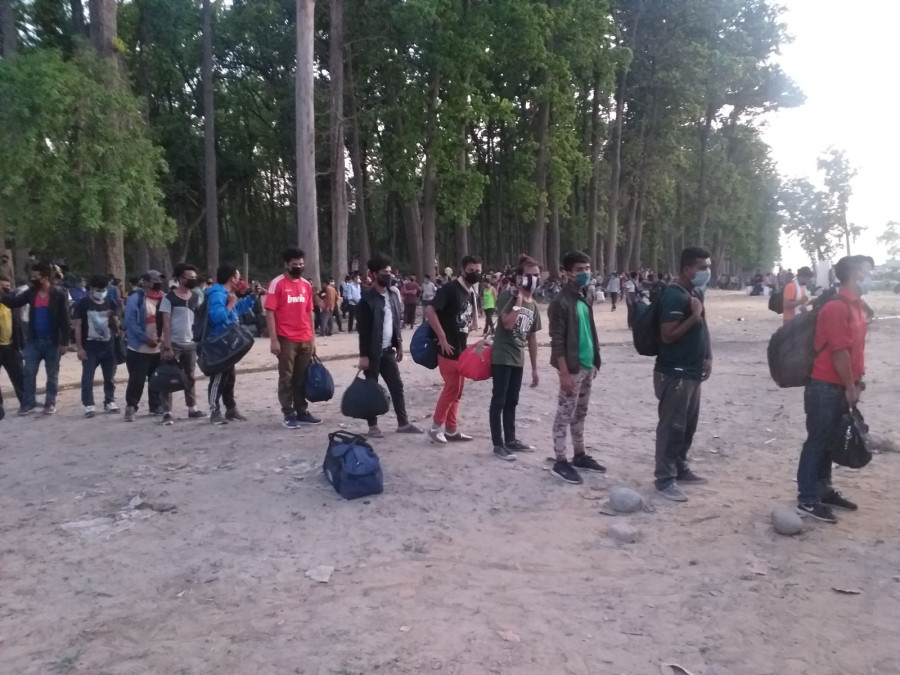Editorial
Local path to prosperity
The state must create opportunities for people willing to stay home and invest in local enterprises.
Officials at the Ministry of Land Management, Agriculture and Cooperatives in Sudurpashchim Province are reported to have faced an elephantine problem recently: They have to sift through 80,000 applications and identify a tiny percentage of the applicants to support them in their agro-entrepreneurial endeavours. The agriculture subsidy programme targeted at returnee migrants in the province aims to support only 5,000 applicants. The ministry's Rs150 million is insufficient to address the subsidy needs of the huge number of people who applied.
Even after the authorities follow a strict screening policy to identify who is genuinely interested to begin livestock development or agro-businesses, the number is expected to remain pretty high for the programme this year to be able to handle. The applications had been collected from all 88 local units in nine districts in the province. The provincial government had even asked the migrant workers not to return to India, and instead find opportunities at home amidst the pandemic. The programme seeks to provide Rs30,000 as seed money for agro-business and up to Rs60,000 for livestock development.
That a large number of people, especially the youth, are keen to stay back and turn entrepreneurs is good news for Nepal. However, the gap between the number of people seeking entrepreneurial opportunities at home and the province's ability to cater to their needs speaks of the deficiency facing local levels across the country. Local governments in many parts of the country have also been providing several skills-based trainings to youths. The opportunities provided by local levels are few and far between, and often fail to yield decent results. This is partly due to the fact that the participants in such trainings are party cadre or relatives of officials, especially when the training involves allowances to the trainees. In cases where the participants are genuinely interested to turn entrepreneurs once the trainings are over, they do not have the wherewithal to make investments in new enterprises.
Unless the government creates a conducive environment for them to begin new enterprises, the idea of employing the youth locally will remain just a pipe dream. Therefore, the government must come up with innovative ways to help them stay afloat. For one, cash support is not the only way local governments can support the youth. In view of their small purses, the local governments, while handing out support in cash and kind, must identify who their beneficiaries are. They must priorities people from marginalised communities, landless people, persons with different abilities, and persons who have lost jobs abroad. They can support others through subsidised loans, insurance policies and agricultural product buy-back schemes. They can also get local banks, financial institutions and non-government organisations to invest a certain percentage of their capital or budget towards supporting the entrepreneurial initiatives at the local level.
No youth would want to go—at least to the labour-intensive and risky job markets in the Gulf and East Asian countries—if they are provided with opportunities to stay and work in the home country. A significant number of Nepali youths who have lost their means of livelihood in foreign countries and have returned home may want to stay back for good, if they are provided with opportunities to make ends meet here itself. The Covid-19 pandemic is an opportune moment for local governments to bring out attractive subsidy programmes for youth entrepreneurs, and use their energies and skills towards local development.
***
What do you think?
Dear reader, we’d like to hear from you. We regularly publish letters to the editor on contemporary issues or direct responses to something the Post has recently published. Please send your letters to [email protected] with "Letter to the Editor" in the subject line. Please include your name, location, and a contact address so one of our editors can reach out to you.




 9.89°C Kathmandu
9.89°C Kathmandu














